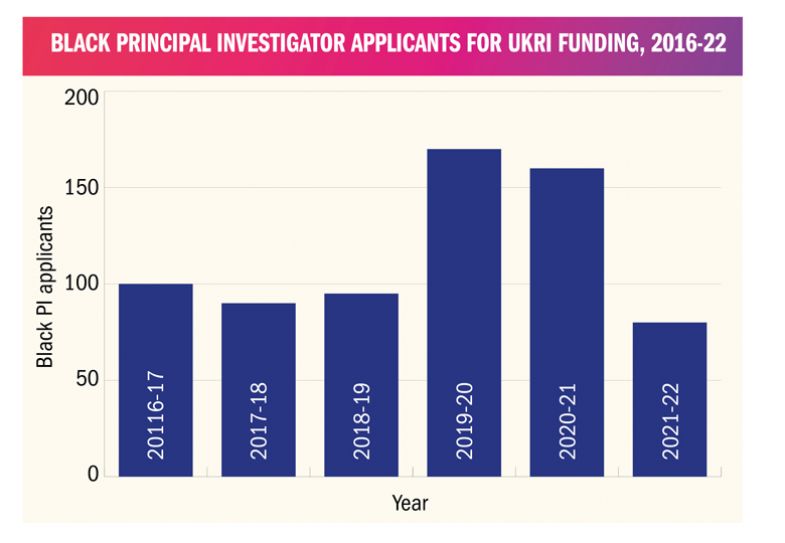The number of black principal investigators (PIs) applying for UK Research and Innovation (UKRI) funding halved in a single year, official data reveals.
Just 80 black PIs applied for funding in 2021-22, the most recent year for which data is available, compared with 160 the year before – and the lowest figure for at least six years, according to statistics released by the UK’s main public research funding body. The number of black co-investigator applicants also dropped significantly, from 825 to 300.
The declines follow years of low success rates for ethnic minority PIs. In the three years prior to 2021-22, the success rate for black PI applicants was 8 per cent, 12 per cent and 12 per cent respectively, while the figures for white applicants were 29 per cent, 30 per cent and 29 per cent. Black applicants typically have the lowest success rate of all ethnic groups, with the figures for Asian PIs standing at 19 per cent, 23 per cent and 21 per cent respectively.

The success rate for black applicants in 2021-22 was higher, at 21 per cent.
The Medical Research Council, one of the best-funded of UKRI’s seven agencies, saw a particularly large drop in applicants in 2021-22, from 85 to 20. Fewer than five were awarded funding.
Robert Mokaya, the University of Nottingham pro vice-chancellor who is thought to be the UK’s only black chemistry professor and will next month join the University of Sheffield as provost, said the difference in success rate by ethnicity was “something that I have observed over the years and it’s very difficult to explain. I have looked at who is applying, and I do not get any sense that black applicants are applying from a lower level or that they are starting from any disadvantage, but the outcome tends to be not equal.”
Professor Mokaya said that he knew black academics “who have gotten to the point where they feel that they should just probably give up because of the amount of time they put in and the outcomes that they have”.
He has been rejected for UKRI funding himself many times. “In my case, if you look at my research profile, you would agree that person should be getting funding,” he said.
In 2020, 10 women wrote an open letter to UKRI drawing attention to the disproportionately low number of black grant winners and the lack of publicly available equality data regarding grant-making decisions. Last year UKRI was criticised when its long-awaited equality, diversity and inclusion strategy failed to mention the words “race”, “racism” or “ethnicity”.
The data also shows that black applicants who were successful received significantly smaller financial rewards than other researchers. The median award for black PIs in 2021-22 was £186,000, compared with £381,000 for white PIs. The median amount black PIs applied for was £318,000, compared with £431,000 for white PIs.
In 2020-21, 6 per cent of the funds applied for by black PIs was awarded (£5 million of £85 million applied for), compared with 31 per cent for white PIs (£1.4 billion of £4.4 billion applied for).
A UKRI spokesperson said that the data reflected “the multiple and significant challenges in attracting, retaining and developing the full range of people that are needed for a thriving research and innovation system”.
“We continue to pilot and test new initiatives to foster a more diverse and inclusive research and innovation system and address the different success rates not just for ethnicity but also for age, gender, and those with a disability,” they said.
Register to continue
Why register?
- Registration is free and only takes a moment
- Once registered, you can read 3 articles a month
- Sign up for our newsletter
Subscribe
Or subscribe for unlimited access to:
- Unlimited access to news, views, insights & reviews
- Digital editions
- Digital access to THE’s university and college rankings analysis
Already registered or a current subscriber? Login








